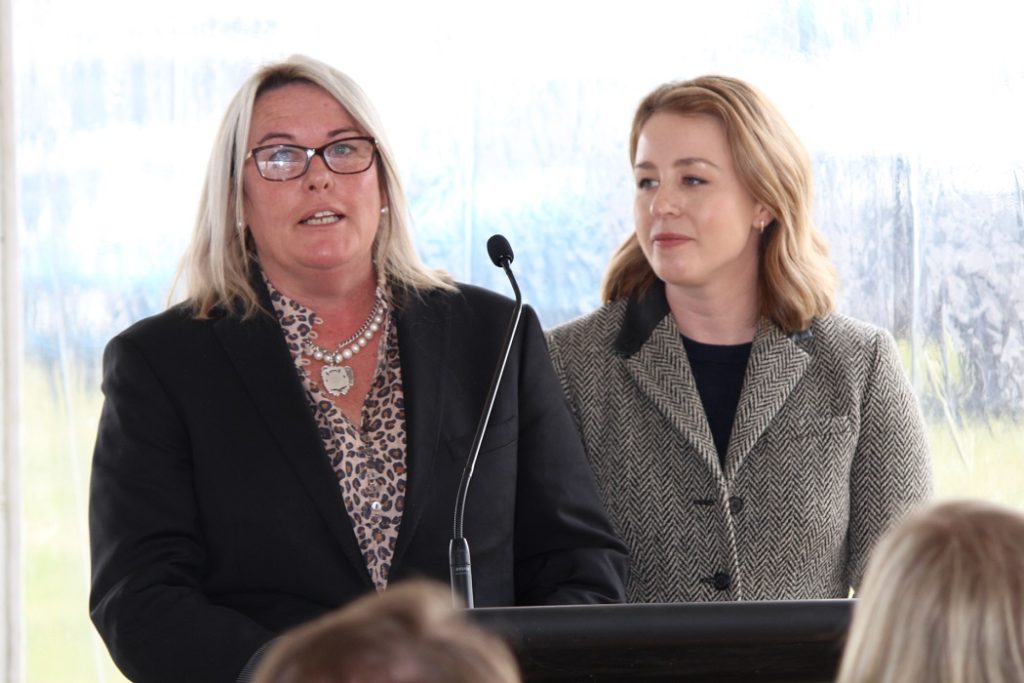
WPA CEO Jo Hall, left, and SPA CEO Bonnie Skinner, at the launch of the first Australian Sheep Sustainability Framework report at Bendigo last month.
PEAK sheep and wool producer bodies have reiterated the priority to harmonise business rules between states to achieve an effective national electronic identification system for small stock.
The bodies said the AMM communique released recently by agriculture ministers acknowledge the seriousness of the biosecurity threats and recognise biosecurity is a shared responsibility between governments, industry and the community.
Sheep Producers Australia and WoolProducers Australia have welcomed the agriculture ministers’ commitment to implementing a national EID system for sheep and goats.
However, the two bodies are seeking clarity on the next steps and the opportunity to collaborate.
SPA chief executive officer Bonnie Skinner said the rapid and reliable tracing of sheep plays a significant part in an emergency disease response.
“The faster the animals are traced the greater the chance of controlling the disease outbreak and so minimising its economic and social effects.
“As a sector, we have consistently highlighted that the consequences of failing to strengthen our traceability system is unacceptable,” she said.
SPA said it has been deliberately and proactively working on the continual improvement of Australia’s livestock traceability capability since 2018 and supports whole-of-system traceability reform, of which individual electronic identification (EID) via ear tags is a vital component.
However WPA CEO Jo Hall said while trials indicate that EIDs deliver quicker tracing of livestock movements, which is critical for any emergency animal disease (EAD) incursion response, these tags will only be effective if the underpinning systems are robust and nationally harmonised.
This includes investment into the database, sustainable and equitable cost-sharing arrangements, and establishing a statutory governing model that can hold all stakeholders to account.
“For mandatory EIDs to succeed the state governments, under whose remit traceability falls, must come together quickly to agree to determine and adhere to guaranteed nationally harmonised business rules.
“The first step in the sheep traceability reform is to agree to these rules and how they will be implemented consistently,” Ms Hall said.
Clarification needed on all SAFEMEAT recommendations
SPA and WPA said they know that the cost to transition the sheep industry from mob-based to individual identification, and the associated system changes required to support that transition, is the most significant step in evolving into a more robust system. They emphasised the need to establish an extensive and effective partnership between government and industry to work collaboratively to implement the road map for a transition.
The two bodies said they would like clarification on the progress of the five recommendations the National Biosecurity Committee (NBC) was provided by SAFEMEAT in 2020 and to be advised when industry will be briefed and informed.
“It must be recognised by government and the general public, that loss of market access for Australian livestock products including wool and meat due to a disease outbreak will be devastating not just to industry but to the entire Australian economy, it is therefore essential that appropriate cost sharing arrangements for the establishment and maintenance of such a system is agreed to by industry and government,” Ms Hall said.
Ms Skinner said given the inherent complexity of traceability, it is only through national cooperation and collaboration that we can strengthen the current system and evolving to the system we need with the required level of urgency.
“We look forward to working collaboratively with government, industry stakeholders and producers to develop and implement a national eID system that works for everyone throughout the supply chain,” she said.
The two bodies also acknowledged the announcement yesterday of a new Commonwealth biosecurity taskforce to be established, ensuring Australia is fully prepared to respond swiftly to growing biosecurity threats, and welcome additional measures to strengthen Australia’s biosecurity.

HAVE YOUR SAY